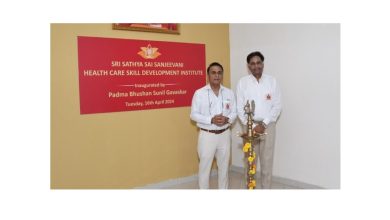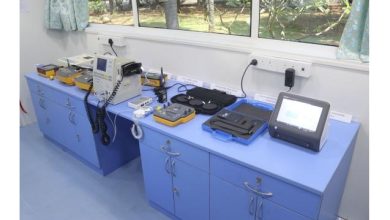ASSOCHAM unveils heart disease-specific health survey report

The survey report titled ‘Non-Communicable Diseases in India’ covered 2,33,672 people and 673 public health offices in 21 states
The Associated Chambers of Commerce and Industry of India (ASSOCHAM), the apex trade association of the country, as part of its ‘Illness to Wellness’ campaign and on the ‘World Heart Day’ unveiled heart disease-specific findings of India’s largest primary healthcare survey report on the rising burden of non-communicable diseases in the country. This was followed by a virtual panel discussion on ‘Dil Maange More – Healthy Heart for a Healthy Long Life.’
The survey report titled ‘Non-Communicable Diseases in India’ covered 2,33,672 people and 673 public health offices in 21 states to analyse the rising cases of NCDs in the country and the social profile of suffering households. The study was conducted by ASSOCHAM jointly with Delhi-based think tank, Thought Arbitrage Research Institute (TARI).
The survey highlighted that heart diseases and hypertension have a prevalence of 1.01 per cent and 3.60 per cent respectively and both the diseases together account for 32 per cent of all NCDs in the country. It observed that the risk and prevalence of heart diseases increase significantly from the age of 36-45 years. According to the report, the prevalence of hypertension is higher in females at 4.04 per cent in comparison to 3.21 per cent for males. It further stated that the incidence of heart diseases is higher in males at 1.13 per cent in comparison to 0.87 per cent for females. The prevalence of both diseases is agnostic to urban or rural geographies.
Delving on the relative risk factors associated with heart diseases, the report observed that a high stress level is the main risk factor for heart diseases at 37 per cent followed by poor dietary habits at 11 per cent. It stated that people who are obese and overweight and live sedentary lifestyles have 9 per cent and 8 per cent higher relative risk respectively and are more prone to developing heart diseases. On the other hand, key relative risk factors for hypertension include low physical activity at 36 per cent and high consumption of junk/street food with high salt content at 30 per cent both of which can lead to obesity that has a relative risk of 24 per cent. Exposure to air pollution at 19 per cent was found to be another significant risk factor for hypertension. The study noted that high consumption of alcohol and tobacco are among other risk factors identified for causing heart ailments and hypertension.
Divulging the low awareness level about their NCDs among respondents, the survey pointed out that more than 40 per cent of the respondents suffering from CVD and hypertension accepted that they were not aware of having their respective diseases for more than three years. The report highlighted that for the heart ailment over 70 per cent of respondents stated that they were diagnosed after one year of suffering.
Highlighting gaps in the treatment-seeking behaviour of people, the report underlined that about 10 per cent of the respondents suffering from CVD or hypertension stated they are not seeking any treatment. On the other hand, for heart and hypertension-related ailments, more than 54 per cent of respondents stated that they are seeking treatment for more than one year. This signifies the high morbidity of these diseases.
The survey further showed that over 52 per cent of CVD/heart disease patients seek medical advice only in the case of an emergency. It pointed out that about 45 per cent of CVD/heart diseases patient seek medical treatment under the direct supervision of doctors while around 3 per cent of CVD/heart diseases patients rely on Ayush – traditional and non-conventional systems of health care and healing, quack, and others which include home treatment, advice from others, treatment on the Internet, etc. It noted that 7.5 per cent of people suffering from heart disease spend more than Rs 50,000 annually for its treatment while 25 per cent of people with heart disease spend between Rs 10-50,000 annually for the same.
As per the study, hypertension, respiratory diseases and diabetes have the highest comorbidity with heart diseases. On the other hand, hypertension has the highest comorbidity with other NCDs, and its prevalence significantly increases the risk of other NCDs. The study observed that the national prevalence rate of heart diseases is 1.01 per cent with North-East states having the highest prevalence of CVD/Heart diseases followed by northern states, West Bengal and Kerala.
The COVID-19 pandemic has brought a sharper focus on health care. Patterns emerging from covid management across the country indicate that people with comorbidities of non-communicable diseases (NCDs) have a higher mortality rate than those who do not.
Gracing the occasion, Anil Rajput, Chairperson, ASSOCHAM CSR Council stated,” The covid pandemic attacked humanity in all imaginable and unimaginable ways. The virus proved capable of damaging the lungs, heart, kidneys, liver, blood, and much more besides wreaking havoc on the mind and causing extreme anxiety and distress. Heart disease cases have been rising steadily in India and we must adopt a holistic approach which includes an active lifestyle, a healthy diet, increasing intake of fruits and vegetables, and managing work stress and work for a healthy long life.”
Dr TS Kler, Chairman, Fortis Memorial Research Institute, Gurugram and Fortis Hospital, New Delhi, said, “Heart disease is among the top killers in the country, but the good news is that many of the heart-related complications are curable, and their treatment is available in the country. I recommend people to do regular exercise, get good sleep, destress themselves, and eat in moderation for a healthy heart and disease-free life.”
Dr JPS Sawhney, Chairman, Department of Cardiology, Sir Ganga Ram Hospital stated, “The cases of heart diseases are increasingly seen among the younger generation. Research has shown that the causes of heart diseases are also genetic in origin, and this can be diagnosed clinically. The lipid profile of children therefore must be done to understand their susceptibility to heart-related complications and start their treatment early to prevent the occurrence of such diseases. Above all, doing everything in moderation is key to a healthy heart for a healthy long life.”
Dr (Col) Manjinder Sandhu, Director Cardiology & Artemis Cardiac Care, Artemis Hospitals commented, “Heart illness is very common among diabetes patients who may not feel pain at the time of heart stroke. They must keep watch on symptoms like breathlessness, confusion, disorientation to anticipate heart attack and must undergo tests at regular intervals to avoid it.”
Dr Raman Puri, Senior Interventional Cardiologist, Cardiac Care Centre, New Delhi Founder and Chairman, Lipid Association of India said, “Heart disease is a very slowly developing disease and is preventable with lifestyle modification. I recommend every parent to give a lipid profile as a gift to their children on their 20th birthday so that they can bring necessary changes in their lifestyle to improve their quality of life and reduce the chances of heart stroke.”
Dr Bipin Kumar Dubey, Head of Department, Cardiac Science Manipal Hospitals, New Delhi said, “Young generation has embraced exercising or working out in a big way and is taking supplement foods to boost muscles. This must be stopped as supplements may contain steroids and ingredients which can adversely affect health. They must socialise with real friends, do regular exercise, avoid high cholesterol fast food and try to pick up early signals to take preventive steps and cut the chances of heart disease and stroke.”
Dr Rajesh Kesari, Founder, and Director, Total Care Control, New Delhi said, “Heart is the most important and precious organ in our body. We need a very healthy heart to keep us going through all the anxieties, stress, and perturbations of life to be able to do and achieve everything. This panel discussion on the eve of ‘World Heart Day’ will see stalwarts in the field of cardiology sharing knowledge with us to keep our heart healthy for a healthy long life.”




